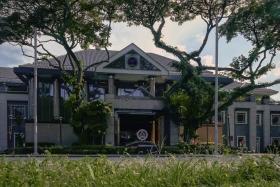Singaporeans earned more in 2017: Study
Singaporeans earned higher incomes last year and unemployment remained low, even amid uncertainties due to the changing global environment.
They also saw improvements in bread-and-butter issues like housing and healthcare.
These were among the findings flagged in the Singapore Public Sector Outcomes Review, which takes stock of how Singapore has fared in key areas of national interest, such as the economy and transport.
The biennial report, released by the Ministry of Finance (MOF) yesterday, said "Singapore is faced with fresh opportunities and new challenges as technologies reshape our economy and society".
As the authorities continue to put in place measures to ensure Singapore rises to the challenge, the report noted that the incomes of Singaporeans at the 20th percentile and median income levels both went up, with these wages growing by 4 per cent every year since 2013.
Though unemployment rates were higher in 2016 and 2017 - crossing the 3 per cent mark - they remained low compared with other countries, the report said.
The push for productivity, which is key to sustainable growth but has been growing sluggishly over the years, also saw results, though gains are uneven across sectors.
Growth in real value-added per actual hour worked increased from 1.4 per cent in 2013 to 4.5 per cent in 2017, while growth in real value-add per worker picked up from 1 per cent to 3.8 per cent over the same period.
The report added that the Government's efforts in getting Singaporeans to embrace lifelong learning have yielded fruit.
It also noted the various ways in which the authorities are helping to manage the cost of living.
In terms of healthcare, government expenditure is expected to more than double, from $3.9 billion in the 2011 financial year to $10.2 billion this financial year.
First-time buyers continue to have access to affordable homes, with the report noting the debt servicing ratio of new four-room Housing Board flats in non-mature estates remaining low at 22 per cent last year.
Last year, 8,100 first-timer families and singles buying resale flats benefited from increased grants put in place since last February.
As for transport, about 1.8 million concession cards, which give discounts of up to 50 per cent on regular adult public transport fares, have been issued to date.
Those with disabilities also get subsidies of up to 80 per cent under the enhanced Taxi Subsidy Scheme, which now covers private-hire cars.
Meanwhile, the needy continue to receive the largest share of transfers from the Government, with 79,000 beneficiaries receiving $131 million in social assistance payouts in the last financial year.
Get The New Paper on your phone with the free TNP app. Download from the Apple App Store or Google Play Store now


